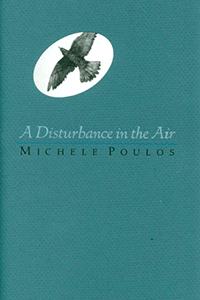 print preview
print previewback EMILIA PHILLIPS
Review | A Disturbance in the Air, by Michele Poulos
Slapering Hol Press, 2012
 |
“I might appear anywhere,” writes Michele Poulos. From her old haunts in New Orleans to a vacation in Greece, from the dreamworld to an imagined sixteenth-century England, the poems of A Disturbance in the Air seemingly “originate in response to landscape,” as Donald Davie once wrote, but also in response to the people who influence—and who are influenced by—landscapes. To call the work in Disturbance poems of place neglects Poulos’s preoccupation with humanity—our great erosive work on the earth and on one other, our misguidedness and our capacity for redemption. Sometimes redemption arrives through love, at other times through the imagination. Poulos writes: “Aren’t we all guilty / of dreaming another world?”
In the first section of “When the Wind Falls,” Poulos describes a scene, precisely located in Mouriki, Greece on April 6, 1941, the date of the Nazi invasion of Greece and Yugoslavia:
Deep in her own dream, the girl presses
two cornhusk dolls together shy of a kiss
in the seconds before she hears,
at first, a distant
roar, perhaps a neighbor’s tractor
ploughing or a growl hidden in the woods.
Soon it grows thin as a falcon’s call
sailing its broad-winged shadow across the field
and she is amused.
It must be her brother,
she thinks, eye shifting toward the boy.
Earlier, he had lifted a kite made of silk
into the air, the tail curling between limbs
tracing sky. His hand pauses now
in midair, as though pointing toward a star.
He laughs, uncertain why the wind
roils at his back.
This scene reveals several characteristic features of Disturbance’s poems. First, Poulos often insists on a specific setting. Additionally, here and throughout the chapbook, place acts almost as a human character, interacting with people, occasionally even personified, as in “Among the Maniots”: “the shore’s / prim neckline,” “wilderness of ache.”
With her background in filmmaking and fiction writing, Poulos tends toward narratives which have their base in clear syntax but make occasional leaps into the interior lives of others, as with the boy who’s “uncertain why the wind / roils at his back.” The emotional resonance of this moment and of the girl listening to a “distant / roar . . . a growl hidden in the woods” lies in our knowing what the children do not yet understand, that the roar and the roiling wind signal the tanks of the Nazi invasion.
Sometimes what’s to come poses a threat: the “dead have a knack / for returning,” she writes. In other cases, the arrival has a deus-ex-machina flourish to it, as when “the Angel of Broken Instruments” is summoned to rescue a distracted man from an almost cartoonish catastrophe—“we are stopped short / on the corner of Third and Main / by a piano fallen from the sky.”
Elsewhere, Poulos uses form to immerse us in her scenes, sometimes emulating physical space or movement. For instance, in “St. Maximos in the Blue Margin,” the saint ritually burns his various Mount Athos dwellings before moving on to a new “crude hut.” The use of internal white space suggests something just lost.
What lonesome burning madness.
His walking stick won’t order the dusk
or the apparitions that must gatheron the rim of sight.
I imagine angels
with black tongues
spinning round his head.
Later, however, the white space serves another function: it can suggest breath; and breath, as we know, urges fire to burn.
Every blue flame a contemplation
deepeningits own suffering.
If each flame here stands for contemplation, then the poem presents both the literal burning of the huts and the flame of thought.
In this way, Poulos sets the stakes high for her poems. The contemplation that surrounds each of her narratives shines brilliantly, and yet it forces her and the reader to reckon with difficult, even emotionally destructive subject matter. From the speaker who says that, at twenty, she would’ve done “anything . . . // for a line or vodka shot” and whose “tenderness // of [her] breasts” furnished “proof / I’d done everything I wanted / no real part of,” to the Hopi boy in “Assimilations of 1918, with Scissors” whose “cropped head is shameful,” Poulos crafts important poems. Raw, tender, elegiac, the writer insists: “We are always more / than what we believe.” ![]()
![]()
Michele Poulos’s chapbook A Disturbance in the Air (Slapering Hole Press, 2012) was a winner for the 2012 Slapering Hol Press Chapbook Competition. Her work has appeared in Best New Poets 2012 and elsewhere.